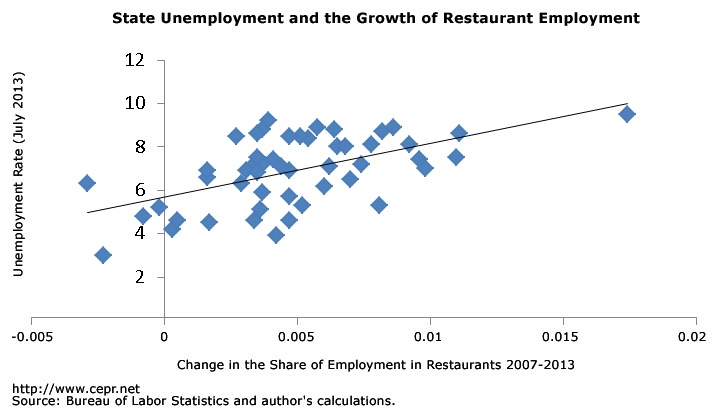September 05, 2013
I did a short post while everyone was out enjoying their Labor Day weekend that I want to briefly revisit. The topic was the growth of bad jobs in the current recovery.
As many people have noted, a disproportionate share of the jobs being created in this upturn are in low-paying sectors like restaurants and retail trade. This means that even the people who are able to find work in the current labor market conditions are unlikely to get a job that will provide enough income to support a family.
This is clearly bad news for large segments of the workforce. The question is why are we seeing so many bad jobs?
On the one hand we have the technology story which tells us the economy has changed. The jobs that used to provide a decent standard of living for the middle class are disappearing. In our brave new world of robots and computers the economy creates some number of very good jobs for the people with the right skills and it creates bad jobs for everyone else.
The other line of reasoning is that it is not technology that has changed, rather it is people’s desperation that is forcing them to take bad jobs that they would not have considered otherwise. In this view the bad jobs were always there, but most people had better alternatives so they didn’t take them. What’s changed from the period when we didn’t see so many bad jobs is that we have a much weaker labor market. The weakness of the labor market is the key factor in this story.
Note that these two stories have very different policy implications. In the first story, we want to train more of the losers to get the skills they need to become winners. For the ones who are too old or just can’t hack computer technology, well maybe we can dig up some spare change to keep them fed and housed, but you know, life is tough.
In the weak labor market story the key is to boost demand. This can be done through government spending, reducing the trade deficit, or by redistributing work through work sharing. If the labor market tightens then people will be able to get better jobs. In fact, if the labor market tightens enough even the bad jobs will become better jobs. In a tight labor market, employers will pay people much more to work in fast food restaurants or as retail clerks.
I decided to use a very simple test to distinguish between these two stories. I looked at the change in the share of hotel and restaurant employment by state, compared with the state’s current unemployment rate. The latter being a good measure of the strength of the labor market.
If the technology story is right, then there should be no relationship between the growth in the restaurant share of employment and the unemployment rate. If anything, we might expect a negative relationship with states that are moving more rapidly into the brave new economy with high restaurant employment also seeing the most job growth, and therefore lower unemployment.
On the other hand, the weak labor market story predicts that a higher unemployment rate would be associated with a larger increase in the restaurant share of employment. This is simply the story that high unemployment rates will make workers more desperate and force them to take bad jobs.
It turned out that the test supported the weak labor market story.

It showed a strong positive relationship between the growth in the share of restaurants employment and the unemployment rate. (The coefficient of the unemployment rate variable was 0.0013 with a t-statistic of 4.65, which is significant at the 1 percent level.) This fact is hard to reconcile with the changing technology story.
This is a very simple test and is far from conclusive, but it suggests that the problem of low paying jobs is simply one of a weak labor market, not a grand shift in technology. While it’s always a good idea to encourage people to develop more skills and get a better education, this is not a solution to the underlying problem. We have to get the economy moving so that we will again be close to full employment.







Comments